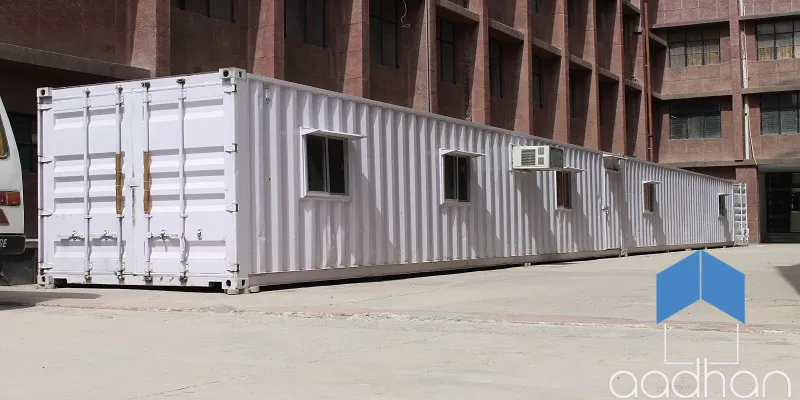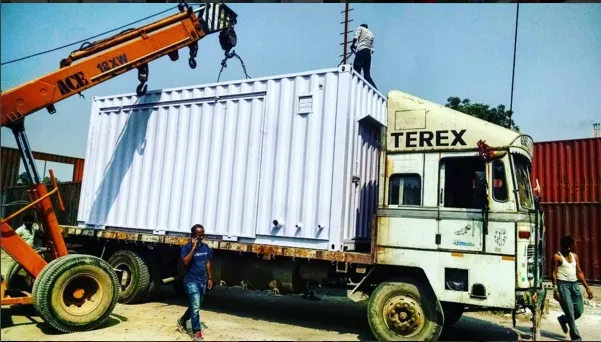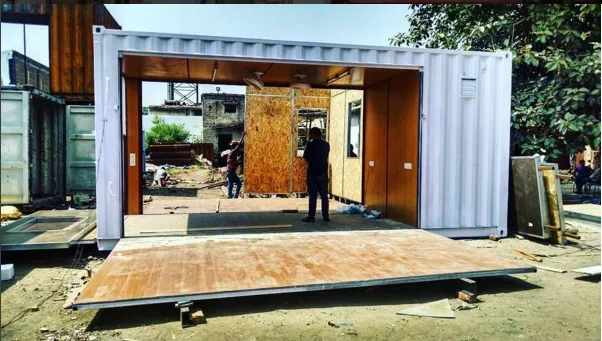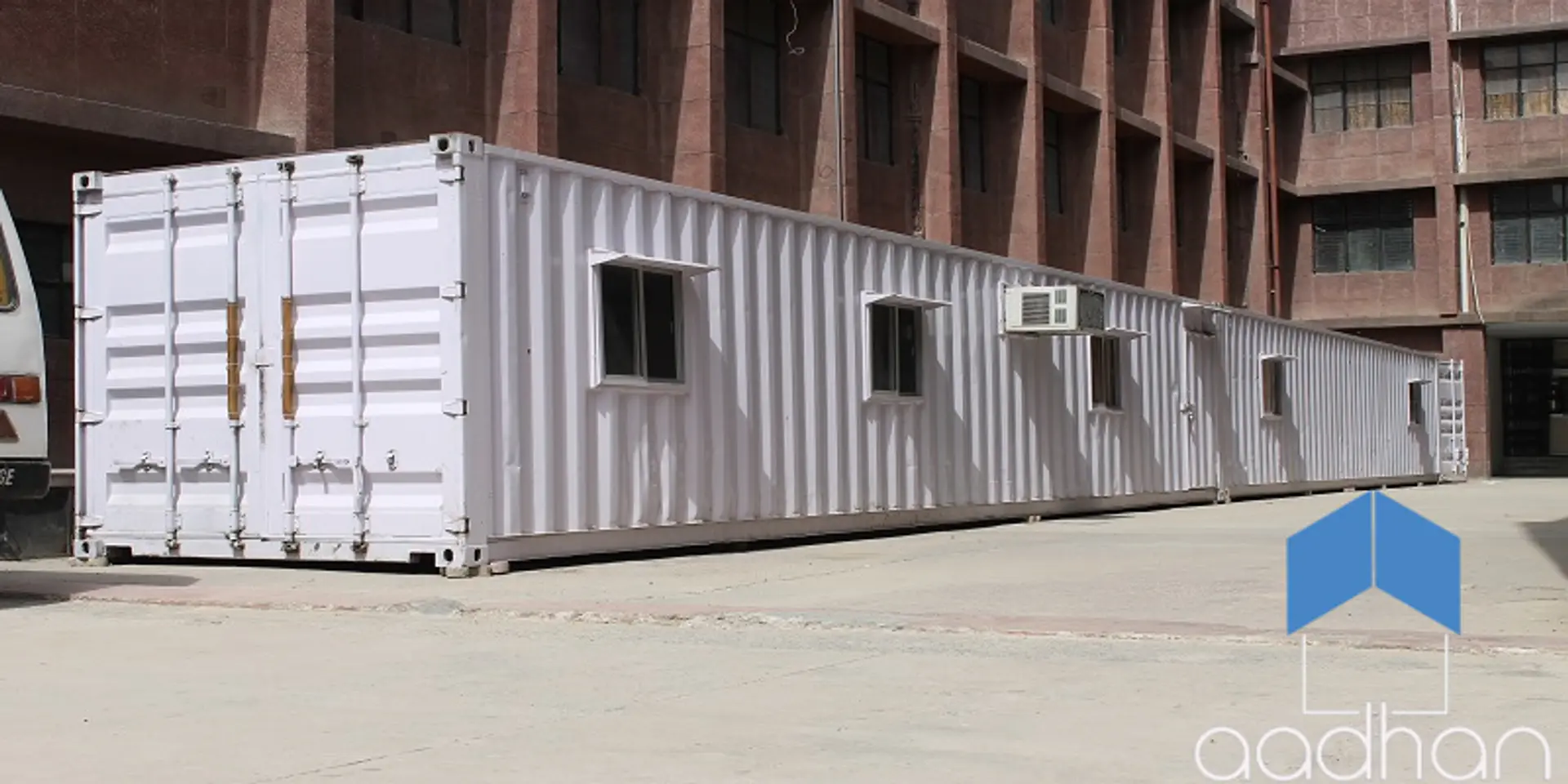How Aadhan converts old shipping containers into eco-friendly buildings

The history of housing is as old as the history of human beings themselves. Over the last few decades though, cement has become the de facto building material of choice. In the context of India and innovation, names that come to the forefront are mainly in the online aggregation space; physical on-the-ground developments mostly remain academic debates. But in this blind chase for standardisation, where we want to make everything uniform, alternative voices need to be put in the spotlight. One such initiative is Nikhil Dugal and Akshay Goel’s Aadhan – a social enterprise focused on converting old shipping containers into sustainable infrastructure. Aadhan makes prefabricated buildings from shipping containers and other recycled materials designed to let anyone operate an off-grid facility anywhere in India. We had a conversation with the enterprising duo to find out more:
YS: Tell us a bit more about yourselves. What were you up to before Aadhan, and what prompted this move?
Nikhil: I have a background in Economics/Math from NYU and was working in the development sector, doing research and public policy. Akshat has an MBA from Kellogg/ESSEC Paris and was handling his family’s furniture business along with a few other small ventures such as as Mimi’s Gelato and Ctrl+Shift+Escape.
I was on the lookout to start a social enterprise of my own and Akshat saw containers being used in South Africa and suggested we start a non-profit chain of budget private schools in containers. However, since we lacked a background in education and his expertise was manufacturing, I suggested we start a social enterprise making eco-friendly infrastructure for other organisations, starting with those working in remote areas in India.
YS: How did you learn to convert these containers into homes?
Nikhil: We did a lot of reading online, and visited a few yards around Delhi, which use them to make offices for construction sites. Over the past year, we’ve figured out how to greatly increase the quality of the product using new input materials and processes. We also know that no one in the market currently treats the containers to make them safe for human habitation, or provides a full turnkey solution that includes design, fabrication, delivery, and installation.


YS: On a personal level, why are you building Aadhan?
Nikhil: Personally, I have a big interest in environmental conservation as well as social enterprise. As a team, we have a passion for innovation and waste prevention, and are looking to work towards that as a for-profit business. All of us love fieldwork, and a lot of our projects require us to spend a lot of time in the field. We can only achieve real impact when we scale so we’re working hard at making scalable product designs for multiple sectors. In the long run, if anyone needs infrastructure set up quickly in a remote area, we want to be the people they think of first.
YS: When was Aadhan started and at what stage are you guys at right now?
Nikhil: My partner Akshat and I started Aadhan early last year, and registered our company in September 2015. We spent the majority of our first year on a scalable classroom design for the Ministry of Rural Development, which is currently in pilot stage, and are hoping to scale that sometime next year. We’ve also set up an office for a school in West Delhi. Post that, we’ve really improved a lot of our production processes, and are currently working on a few scalable designs. We also have a lot of customisation projects and we’re also trying to break into the events space with infrastructure for music festivals around NCR.
I’d say we’re still in the post-pilot stage where we’re trying to test our product in different sectors including CSR, NGOs, eco-tourism, events, restaurants, and other industries that have chains. We also just participated in the Real Deal on NDTV, the world’s first impact investing show, which was a great experience.
YS: How does the economics work out? What is the revenue model? How is the company doing financially?
Akshat: We’re registered as a private limited and our revenue is through sales and rentals. We’re also trying to break into the CSR space and generate revenue from facility donations to NGOs. Financially, we’re generating revenue but the sales cycles in the infrastructure space are very long, which leads to really uneven cash-flows, which have been a problem. We’re fully bootstrapped, so we’re hoping we cross a lot of our ongoing projects off this year so we can expand our business development team.
YS: How has the response been? Where are the orders coming from?
Akshat: We’ve received a great response so far, and are starting to market ourselves now that we have a few projects completed, are familiar with the production process, and are confident about our product. We definitely believe product design comes first and foremost here at Aadhan.
A lot of our orders are from the NGO space, such as a library for an NGO in UP and another NGO facility in Chattisgarh. In the B2C space, we’re currently making two houses in Bombay and Tamil Nadu, respectively, and are starting to market ourselves to prospective farmhouse owners. In the B2B space, the product has real value for businesses looking to scale quickly across Tier II and III cities, such as clinics and retail stores. We’re still conducting testing across a breadth of sectors to see where we get the strongest response.
YS: What are you focusing on currently?
Akshat: Currently, we’re starting a marketing campaign both offline and online. We’re working on two really exciting scalable designs, an eco-friendly retail store, and a high-end toilet, which can be rented out at events. We’re also currently building a furniture showroom in Noida, which should also serve as a proof-of-concept for eco-hotels and farmhouses, and we’re trying to scale up our project with the government. We also want to get involved in the sanitation space, and are working on an eco-friendly toilet for two locations in Delhi.
As a social enterprise, Aadhan provides substantial on-the-ground value. If their projects in sanitation fly, they can create a significant impact in the nation. Innovation in infrastructure is rarely spoken about in the mainstream media, but it is an area that affects human life deeply. There are a few efforts being made in different parts of India; for instance, Dharamalaya Institute in Himachal Pradesh and Auroville’s Earth Institute are prime movers in the space and there are many more individuals like Didi Contractor, Trupti Doshi, Biju Bhaskar working in the area to make a difference. For Aadhan, the approach is slightly different in terms of material, but the intent is the same – let’s put more thought into how we build our structures.
Website: Aadhan



